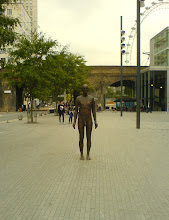Deservedly lauded since the news of his death was announced on Christmas Day, friends of Harold Pinter in the theatre have uniformly mourned their loss of a generous companion who happened also to be a genuine literary giant. Influenced by the purity of language found in the prose and dramatic writings of Samuel Beckett, Pinter became, in retrospect, his only real theatrical equal. While literary movements came and went, he had that rare allusive gift of contemporaneity.
What was astonishing about Harold Pinter was that right from his first play, 1957's The Room, he seemed ready-formed as a devastatingly incisive and individual voice. Both in the spare, halting, guarded nature of his dialogue and the observation of the underlying menace in the everyday. Pinteresque. That adjective described his impact on a culture far wider than theatre and film, but its flattering coinage had already become a burden by as early as the mid-1960s (as a recently republished interview with The Paris Review from the era touches on). Stubbornly, his writing fought on regardless against such labels of containment that hinted at mere artifice and cynical mannerism.
Until the publication of Michael Billington's 1996 biography, we never realised just how much Pinter drew personally on his own experience to create comedies of such existential menace. A Jewish boyhood in pre-war Hackney and a post-war life spent in digs as a repertory actor provided much of the starting points for his creations. Similarly, his latterly regular appearances campaigning for human rights and a stunning denunciation of US and British foreign policy in his 2005 Nobel Prize acceptance speech revealed his ingrained forceful use of metaphor and a precise construction of language. Never less than impressive, he was the real deal who left us with a call to arms that was implicit throughout his mature work:
I believe that despite the enormous odds which exist, unflinching, unswerving, fierce intellectual determination, as citizens, to define the real truth of our lives and our societies is a crucial obligation which devolves upon us all. It is in fact mandatory.
Monday, 29 December 2008
Monday, 22 December 2008
Strange News From Other Stars
No good comes from a black hole. Or so I believed. One only has to bring to mind government borrowing requirements or Disney's ill-conceived eponymous 1979 blockbuster. Not even an infinitesimal pin-prick of light can escape from their Stygian depths. They mark the cold end of things. To borrow T.S. Eliot's subtly menacing lines from 'East Coker', 'O dark, dark, dark. They all go into the dark. / The vacant interstellar places, the vacant into the vacant'. So the news scientists from the Max Planck Institute for Extraterrestrial Physics have proved that a black hole approximately four million times the size of our own sun lies at the centre of our galaxy, was pause for thought. It had long been theorised so, but now it is fact. The sheer scale, even in typically massive astronomical terms, is impressive. And yet, in a self-revealing glass half-empty way, I was seeing the implications for the Milky Way: the eventual cannibalism of any nearby matter as it is drawn in by the terrific forces of gravity. Which was plainly silly. I mean, that would take trillions of years to happen. Long after our sun had consumed the Earth in nuclear fire. Long beyond the life-span of the human race. Or even what the human race becomes. As Robert Frost sensibly proclaims on the matter, I say 'They cannot scare me with their empty spaces'.
My own intimations of mortality and fondness for our stellar backyard momentarily obscured the wonder of the news. Far from being merely agents of destruction, this research (along with a study on early galaxy formation by Durham, Cardiff and Caltech scientists) suggests black holes were integral to the formation of stars and galaxies by allowing high density environments
where atoms could gain substance. Thus from them flowed smoked salmon, the Renaissance, weeping willows, Groucho Marx and Tuesdays. At this time of year, where season and myth collide in a mish-mash of consumerism and festival, this is the really glorious news for all of us to celebrate and marvel at. Demonstrably, as Joni Mitchell sang, 'We are stardust / We are golden'.
My own intimations of mortality and fondness for our stellar backyard momentarily obscured the wonder of the news. Far from being merely agents of destruction, this research (along with a study on early galaxy formation by Durham, Cardiff and Caltech scientists) suggests black holes were integral to the formation of stars and galaxies by allowing high density environments
where atoms could gain substance. Thus from them flowed smoked salmon, the Renaissance, weeping willows, Groucho Marx and Tuesdays. At this time of year, where season and myth collide in a mish-mash of consumerism and festival, this is the really glorious news for all of us to celebrate and marvel at. Demonstrably, as Joni Mitchell sang, 'We are stardust / We are golden'.
Subscribe to:
Posts (Atom)


